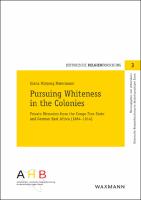Pursuing Whiteness in the Colonies
Private Memories from the Congo Freestate and German East Africa (1884–1914) (Volume 3)
Author(s)
Natermann, Diana Miryong
Collection
Knowledge Unlatched (KU)Number
7178Language
EnglishAbstract
Pursuing Whiteness in the Colonies offers a new comprehension of colonial history from below by taking remnants of individual agencies from a whiteness studies perspective. It highlights the experiences and perceptions of colonisers and how they portrayed and re-interpreted their identities in Africa. The transcolonial approach is based on egodocuments from Belgian, German and Swedish men and women who migrated to Central Africa for reasons like a love for adventure, social betterment, new gender roles, or the conviction that colonising was their patriotic duty.<br/><br/>The author presents how colonisers constructed their whiteness in relation to the subalterns in everyday situations connected to friendship, animals, gender and food. White culture was often practiced to maintain the idea(l) of European supremacy, for example by upholding white dining cultures. The welcoming notion of ‘breaking bread’ was replaced by a dining culture that reinforced white identity and segregated white from non-white people.<br/>By combining colonial history with whiteness studies in an African setting the author provides a different understanding of imperial realities as they were experienced by colonisers in situ.
Keywords
Political Science; Colonialism & Post-colonialismDOI
https://doi.org/10.31244/9783830936909ISBN
9783830986904Publisher
Waxmann VerlagPublisher website
https://www.waxmann.com/Publication date and place
2018Grantor
Imprint
Waxmann Verlag GmbHClassification
Colonialism and imperialism


 Download
Download